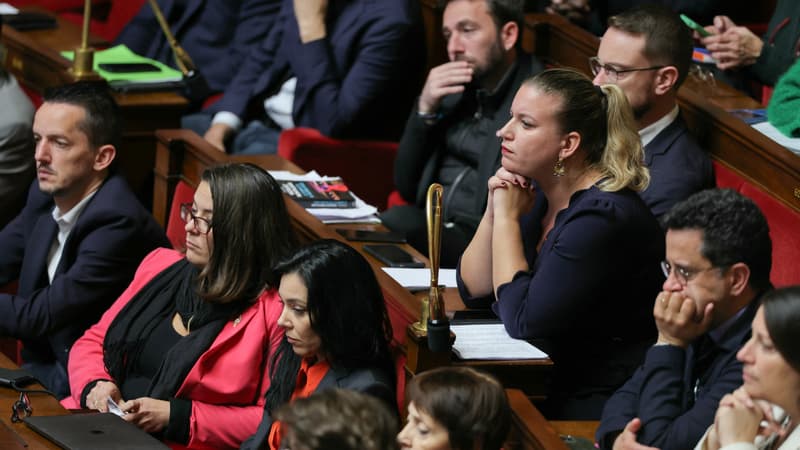A controversy that agitates the ranks of the government but also part of the left. The rebels presented a bill on November 19 to repeal the crime of advocacy of terrorism from the penal code and reincorporate it into the press law.
This crime, whose scope had long been restricted, became a common law crime in 2014. The explosion of its use in recent years, and particularly since the Hamas attacks against Israel, raises questions for jurists.
A crime with vague outlines
The penal code does not define what advocacy of terrorism is. To have a precise definition it is necessary to refer to the jurisprudence of the criminal chamber of the Court of Cassation. These are comments that “present an act of terrorism or its perpetrator in a favorable light.”
The French administration’s website gives the example of a person wearing a T-shirt with the inscription “born on September 11, I am a bomb” and who could be convicted of advocating terrorism in reference to the September 11 attacks in 2001 in the United States. floor.
Another case, this time real: last April, the CGT of the North published a pamphlet, later withdrawn, that directly echoed the Hamas attacks against Israel on October 7, 2023. It said: “The horrors of the illegal occupation have accumulated since (October 7), they are receiving the responses they provoked.
In recent months, in the context of Hamas attacks against Israel, complaints have been filed against dozens of people, including former presidential candidate, Jean-Luc Melenchonthe president of the LFI deputies, Mathilde Panot, the NPA spokesperson Philippe Poutou or even former basketball player Émilie Gomis.
Included in the penal code and more punished
This crime was included in the penal code in November 2014 by the then Minister of the Interior, Bernard Cazeneuve. Before the 2014 law, this crime existed, but in the press law, strongly restricting its contours.
A person accused by the courts of the crime of glorifying terrorism risked five years in prison and a fine of 45,000 euros, as specified in the law of July 29, 1881 on freedom of the press.
Specifically, taking into police custody is now simplified and immediate appearance is now possible. The legal sanctions imposed are also increased: they now amount to 7 years in prison and a fine of 100,000 euros. The limitation period has also been extended from 3 to 6 years.
This law has had undeniable effects: according to a report by a commission of inquiry of the National Assembly, between 1994 and 2014 only 14 convictions were handed down. In 2016 alone, there were no less than 421 convictions.
“Before the Cazeneuve law, the defense of terrorism responded to an extremely restrictive procedural framework to encourage authorities to resort to litigation only in the most extreme cases,” he states. public senate Olivier Cahn, professor of Criminal Law at the University of Cergy.
Judicial proceedings that broke out after the attacks on Israel
In the wake of the Hamas attacks, the then Minister of Justice, Éric Dupond-Moretti, had also drafted a circular ordering prosecutors to initiate proceedings on this basis for any public comments that “praised the attacks” by Hamas or “presented” them. as a legitimate resistance”. to Israel.”
The Paris prosecutor’s office has a total of 386 complaints related to the conflict between Israel and Hamas, according to AFP figures. For several jurists, the legal situation has evolved significantly in recent months.
“Normally, this crime should target the most serious cases, such as the promotion of terrorist actions. These are rather critical comments against Israel’s position, which in themselves do not constitute an apology,” laments lawyer Vincent Brengarth. The world.
This specialist represents Rima Hassan, European deputy of the LFI, involved in several processes related to the crime of glorifying terrorism.
France condemned
One case supports his argument: France’s 2022 conviction by the European Court of Human Rights in this matter. Jean-Marc Rouilhan, co-founder of the far-left armed group Action Directe, described the perpetrators of the attack on Charlie Hebdo in 2015 as “very brave.”
Result: an eight-month prison sentence. The European court condemned Paris for “the harshness of the criminal sanction”, regretting an “interference in freedom of expression”, “unnecessary in a democratic society”.
There are so many elements that push La France to want to eliminate the crime of advocating terrorism from the penal code. Mathilde Panot explained on BFMTV on Sunday that she wanted to “put” this crime “in the right place” in the law, including it back in the press code.
Therefore, this crime would not disappear, but much more precise control would be exercised, which would most likely lead to a reduction in the number of prosecutions.
If this text by the rebel deputy Ugo Bernacilis aroused the anger of the right in the ranks of the government through the voice of the Minister of the Interior (Bruno Retailleau) and the Minister of Justice (Didier Migaud), the left did not. He’s not gentle either.
PS First Secretary Olivier Faure criticized the proposed LFI law, stating that it was “imperative to protect public liberties but also to protect the French from fanaticism and calls for violence and hatred.”
A text that shouldn’t go anywhere
However, during the European campaign, the summons before the judges of Rima Hassan, then the LFI candidate, caused great displeasure. “Political disputes” should not “be resolved in court,” Raphaël Glucksmann, head of the Socialist Party-Public Place list for the European elections, told AFP.
The same story for the National Rally. “We should not call on political opponents,” said deputy Jean-Philippe Tanguy.
Meanwhile, the La France insoumise bill has little future for the moment. It is not included in the rebels’ niche – scheduled for this Thursday, November 28 in the Assembly – which gives them control of the parliamentary agenda for one day, and we can hardly imagine other political parties taking part.
Source: BFM TV


